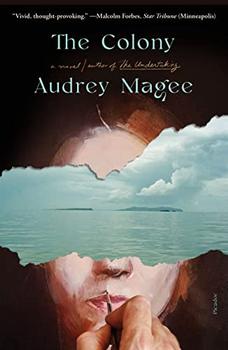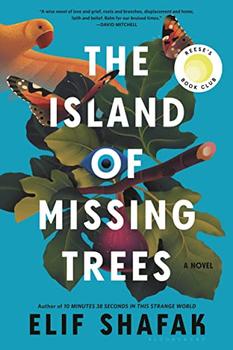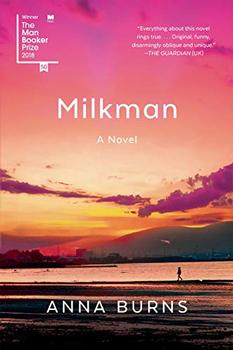Summary | Excerpt | Reviews | Beyond the book | Read-Alikes | Genres & Themes | Author Bio

Critics' Opinion:
Readers' Opinion:
First Published:
May 2022, 384 pages
Paperback:
Jun 2023, 384 pages
 Book Reviewed by:
Book Reviewed by:
Amanda Ellison
Buy This Book
The Colony opens with Mr Lloyd, a London artist, being transported to a Gaeltacht (Irish-speaking) island in a hand-rowed currach, eschewing the more convenient passenger ferry. This attempt at immersing himself in the local customs results in the regurgitation of his breakfast. A rather innocuous episode, it could nevertheless be read as symbolic of much larger issues that erupt when one culture gate-crashes another: exploitation, dilution of indigenous identity, conflict — all of which are examined by Magee in this discomfiting narrative.
Lloyd is traveling to the nameless island in search of solitude and inspiration; the painter's imagination is freighted with clichés of "raw, rugged, violent beauty," conveying all the innocence — ignorance? — of the outsider. The island's undesignated status in the novel may itself be significant: It implies stolen identity as a result of foreign dilution, or perhaps signifies that it is representative of all colonized habitats. Stylistically, Lloyd's pretensions are wrought through Magee's prose, which shifts into lyrical columns to illustrate her protagonist's interior monologue, punctuated with italicized captions — Self-portrait: alone, for example — that he imagines for each vignette.
The Englishman's hosts on the sparsely-populated island, the Gillans, are a multi-generational Irish-speaking family. They immediately have their visitor's measure, with the youngest family member, James, denouncing Lloyd's patronizing bearing as "obnoxious." Lloyd's disagreeable disposition is brought further to the fore when he discovers that the cottage next door has been rented for the summer by a French linguist, Jean-Pierre Masson (JP), who is working on a thesis founded on the moribund Irish language. Neither incomer has been forewarned of the other's presence, and they immediately clash, much like "[t]wo bulls in a field." Both become territorial: Lloyd because he had imagined himself to have some sort of exclusive entitlement to the island (at one point the family has to remind him that he "rented the cottage ... Not the island"); JP because he perceives the proximity of an English-speaking inhabitant as something that will skew his research and speed up the decline of an already diminishing language. The interlopers' conflict is weighted with the baggage of history, which the Gillans astutely recognize: "They've been squabbling over our turf for centuries."
As the story unfolds, it is revealed that JP's Algerian mother was abused by her French partner — this may account for the linguist's abhorrence of foreign influence. He even goes so far as to insist on addressing James as Séamus (the boy's Irish name), against the young man's express wishes. With all the blinkered arrogance of the colonist, JP pillages his subjects — irrespective of the standpoint of the colonized — while, paradoxically, earnest in his pursuit of preserving their linguistic heritage.
Teenager James becomes a pivotal individual in the novel, epitomizing the impact of external influence. Unlike his great-grandmother, pipe-smoking monoglot Bean Uí Fhloinn, who "has no English," James's language is thoroughly Anglicized. For JP, Lloyd's residence on the island means that the "linguistic evolution" — which he acknowledges is taking place — will alternate to a "sudden and violent" monolingualism in the form of English. Meanwhile, James becomes an apprentice to Lloyd, exhibiting a raw talent the mentor himself does not possess. For James, whose father and grandfather both drowned while out fishing, it is deemed "[b]etter to be an artist drawing death, instead of being death." James's desire to break with tradition does, therefore, lend some credence to JP's assertion that outside influences exacerbate the death of tradition. Interestingly, Magee chooses not to use speech punctuation; consequently, all communication — verbal or internal — becomes an organic element of the tapestry of the island: Traditional language and behaviors intermingle with incoming influences — including the two foreign visitors. What becomes clear is that both men have mythologized the community, consumed by their own agendas — perhaps the hallmark of the colonist.
But the two summer inhabitants are not the only source of territorial conflict in The Colony. Stark, bulletin-style accounts of real-life atrocities on the mainland coldly explode from the page in chapters that are brief, factual, clinical. They are a forceful reminder that this is 1979, when terrorist acts carried out by both Loyalist paramilitaries and the Provisional IRA are at their peak. Attacks are savage and frequent; each chapter's end is marked by a jolting reminder of their existence. Historical fiction and historical fact are juxtaposed, indicative of the nature of history itself. And at the root of this brutal bloodshed is colonization, enmeshed in the long and complicated history of England's violation of Ireland.
Traditionally, the island is a literary trope used to represent a refuge, and a simpler, purer way of life. Magee unmasks this misconception. The pace of life may be slower and more detached, as echoed in her unhurried, dispassionate prose, but is never impervious to infiltration; the aggressors are never too far off. After the cultural looters have gleaned their treasures, the islanders, and others like them, are left to navigate the aftermath.
![]() This review was originally published in The BookBrowse Review in May 2022, and has been updated for the
July 2023 edition.
Click here to go to this issue.
This review was originally published in The BookBrowse Review in May 2022, and has been updated for the
July 2023 edition.
Click here to go to this issue.

If you liked The Colony, try these:

by Elif Shafak
Published 2023
A rich, magical new novel on belonging and identity, love and trauma, nature and renewal, from the Booker-shortlisted author of 10 Minutes 38 Seconds in This Strange World.

by Anna Burns
Published 2018
Winner of the 2018 Man Booker Prize, Milkman is a tale of gossip and hearsay, silence and deliberate deafness. It is the story of inaction with enormous consequences.





The House on Biscayne Bay
by Chanel Cleeton
As death stalks a gothic mansion in Miami, the lives of two women intertwine as the past and present collide.

The Flower Sisters
by Michelle Collins Anderson
From the new Fannie Flagg of the Ozarks, a richly-woven story of family, forgiveness, and reinvention.

The Funeral Cryer by Wenyan Lu
Debut novelist Wenyan Lu brings us this witty yet profound story about one woman's midlife reawakening in contemporary rural China.
Your guide toexceptional books
BookBrowse seeks out and recommends the best in contemporary fiction and nonfiction—books that not only engage and entertain but also deepen our understanding of ourselves and the world around us.